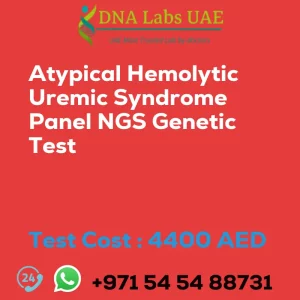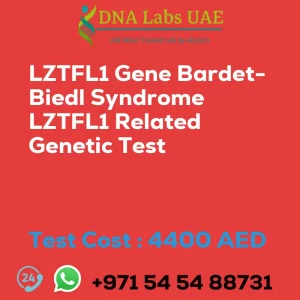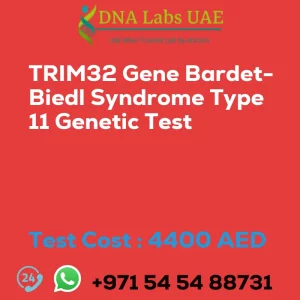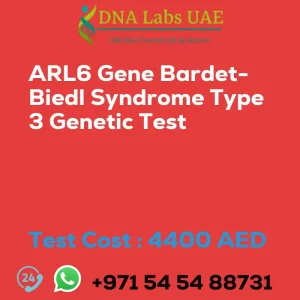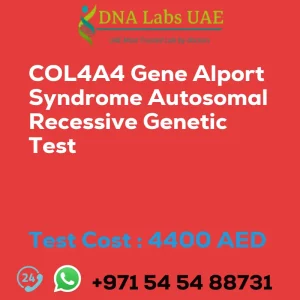VIPAS39 Gene Arthrogryposis Renal Dysfunction and Cholestasis Type 2 Genetic Test
At DNA Labs UAE, we offer the VIPAS39 Gene Arthrogryposis renal dysfunction and cholestasis type 2 Genetic Test. This test aims to identify any mutations or variations in the VIPAS39 gene that may be responsible for causing Arthrogryposis, renal dysfunction, and cholestasis type 2 (ARCND2).
Test Components
- Price: 4400.0 AED
- Sample Condition: Blood or Extracted DNA or One drop Blood on FTA Card
- Report Delivery: 3 to 4 Weeks
- Method: NGS Technology
- Test Type: Hepatology Nephrology Endocrinology Disorders
- Doctor: General Physician
- Test Department: Genetics
Pre Test Information
Prior to undergoing the VIPAS39 Gene Arthrogryposis renal dysfunction and cholestasis type 2 Genetic Test, it is important to provide the clinical history of the patient. Additionally, a Genetic Counselling session will be conducted to draw a pedigree chart of family members affected with ARCND2. This will help in understanding the inheritance pattern of the VIPAS39 gene.
Test Details
The VIPAS39 gene is associated with a rare genetic disorder called Arthrogryposis, renal dysfunction, and cholestasis type 2 (ARCND2). This disorder is characterized by multiple joint contractures (arthrogryposis), kidney dysfunction (renal dysfunction), and liver problems (cholestasis).
NGS stands for Next-Generation Sequencing, which is a high-throughput DNA sequencing technology used to analyze multiple genes simultaneously. The NGS Genetic Test for the VIPAS39 gene aims to identify any mutations or variations in the VIPAS39 gene that may be responsible for causing ARCND2.
This genetic test can help diagnose ARCND2 in individuals with symptoms suggestive of the disorder. It can also be used for carrier testing in individuals with a family history of ARCND2, as well as for prenatal testing in families with a known VIPAS39 gene mutation.
The results of the NGS Genetic Test for the VIPAS39 gene can provide valuable information for clinical management, genetic counseling, and potentially guide treatment options for individuals affected by ARCND2. It is important to consult with a healthcare professional or genetic counselor to understand the implications of the test results and to discuss appropriate management strategies.
| Test Name | VIPAS39 Gene Arthrogryposis renal dysfunction and cholestasis type 2 Genetic Test |
|---|---|
| Components | |
| Price | 4400.0 AED |
| Sample Condition | Blood or Extracted DNA or One drop Blood on FTA Card |
| Report Delivery | 3 to 4 Weeks |
| Method | NGS Technology |
| Test type | Hepatology Nephrology Endocrinology Disorders |
| Doctor | General Physician |
| Test Department: | Genetics |
| Pre Test Information | Clinical History of Patient who is going for VIPAS39 Gene Arthrogryposis, renal dysfunction, and cholestasis type 2 NGS Genetic DNA Test. A Genetic Counselling session to draw a pedigree chart of family members affected with VIPAS39 Gene Arthrogryposis, renal dysfunction, and cholestasis type 2 NGS Genetic DNA Test gene VIPAS39 |
| Test Details |
The VIPAS39 gene is associated with a rare genetic disorder called Arthrogryposis, renal dysfunction, and cholestasis type 2 (ARCND2). This disorder is characterized by multiple joint contractures (arthrogryposis), kidney dysfunction (renal dysfunction), and liver problems (cholestasis). NGS stands for Next-Generation Sequencing, which is a high-throughput DNA sequencing technology used to analyze multiple genes simultaneously. The NGS Genetic Test for VIPAS39 gene aims to identify any mutations or variations in the VIPAS39 gene that may be responsible for causing ARCND2. By analyzing the VIPAS39 gene, this genetic test can help diagnose ARCND2 in individuals with symptoms suggestive of the disorder. It can also be used for carrier testing in individuals with a family history of ARCND2, as well as for prenatal testing in families with a known VIPAS39 gene mutation. The results of the NGS Genetic Test for VIPAS39 gene can provide valuable information for clinical management, genetic counseling, and potentially guide treatment options for individuals affected by ARCND2. It is important to consult with a healthcare professional or genetic counselor to understand the implications of the test results and to discuss appropriate management strategies. |


